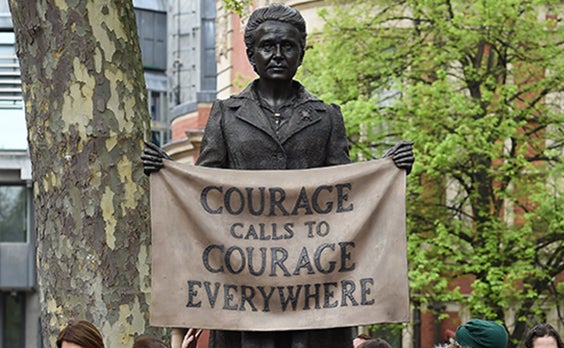London has more statues of animals than named women, study finds
More than 300 of about 1,500 monuments are of named men

Your support helps us to tell the story
From reproductive rights to climate change to Big Tech, The Independent is on the ground when the story is developing. Whether it's investigating the financials of Elon Musk's pro-Trump PAC or producing our latest documentary, 'The A Word', which shines a light on the American women fighting for reproductive rights, we know how important it is to parse out the facts from the messaging.
At such a critical moment in US history, we need reporters on the ground. Your donation allows us to keep sending journalists to speak to both sides of the story.
The Independent is trusted by Americans across the entire political spectrum. And unlike many other quality news outlets, we choose not to lock Americans out of our reporting and analysis with paywalls. We believe quality journalism should be available to everyone, paid for by those who can afford it.
Your support makes all the difference.The number of animal statues in London is double that of named women, research has found.
Out of about 1,500 monuments in the capital, almost 50 (four per cent) are dedicated to historical women – and just three of that small number are of women of a black or minority ethnic background.
Some of the statues of women include the Parliament Square monument of suffragette Millicent Fawcett.
Among others, there are statues of writer Virginia Woolfe, actor Sarah Siddons, spy Noor Inyat Khan, and nurse Mary Seacole.
For comparison, almost 100 (eight per cent) of the total number of statues in London are of animals.
More than 300 (20.5 per cent) of the 1,500 monuments are of named historical men – and many of them are on horseback, which could be a driver behind the number of animal statues.
Overall, at least 79 per cent of the total number of monuments in London are dedicated to historical figures of both sexes.
The research was conducted by Art UK and part-funded by City Hall. It is the first comprehensive audit of public sculpture and monuments across the capital.
The findings released on Friday came a day after Mayor of London Sadiq Khan announced a £1 million “Untold Stories” fund as the first measure in City Hall’s effort to diversify London’s landmarks and monuments to that they better reflect the capital’s multicultural population.
Grants of up to £25,000 will be given to successful applicants so that the artists can create displays, murals, and street art that celebrate London’s diverse history.
Mr Khan said: “London’s diversity is its greatest strength but for far too long our capital’s statues, street names and buildings have only shown a limited perspective on our city’s complex history.
“I’m determined to do everything I can to ensure our public realm presents a more complete picture of everyone who has made London the incredible city it is today.
“That’s why I’ve launched a £1million fund to help the diverse communities who know our city best lead the way in celebrating our capital’s Untold Stories.”
The mayor’s Commission for Diversity in the Public Realm was announced last year after the toppling of slave trader Edward Colston’s statue in Bristol during the height of the Black Lives Matter movement.
Mr Khan has insisted that his Commission will not remove existing statues, but that it could consider “new ideas” for some street names.
Join our commenting forum
Join thought-provoking conversations, follow other Independent readers and see their replies
Comments